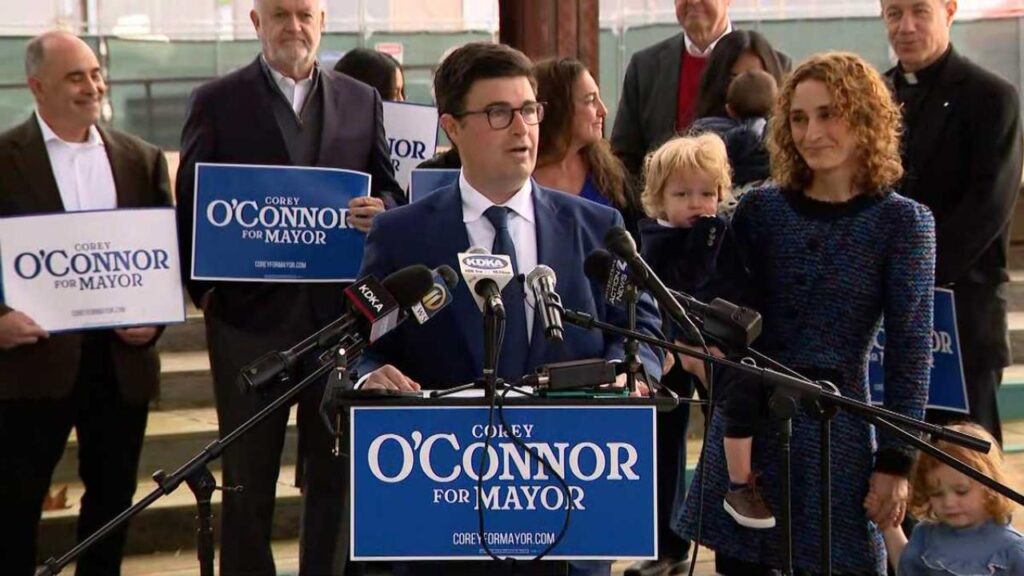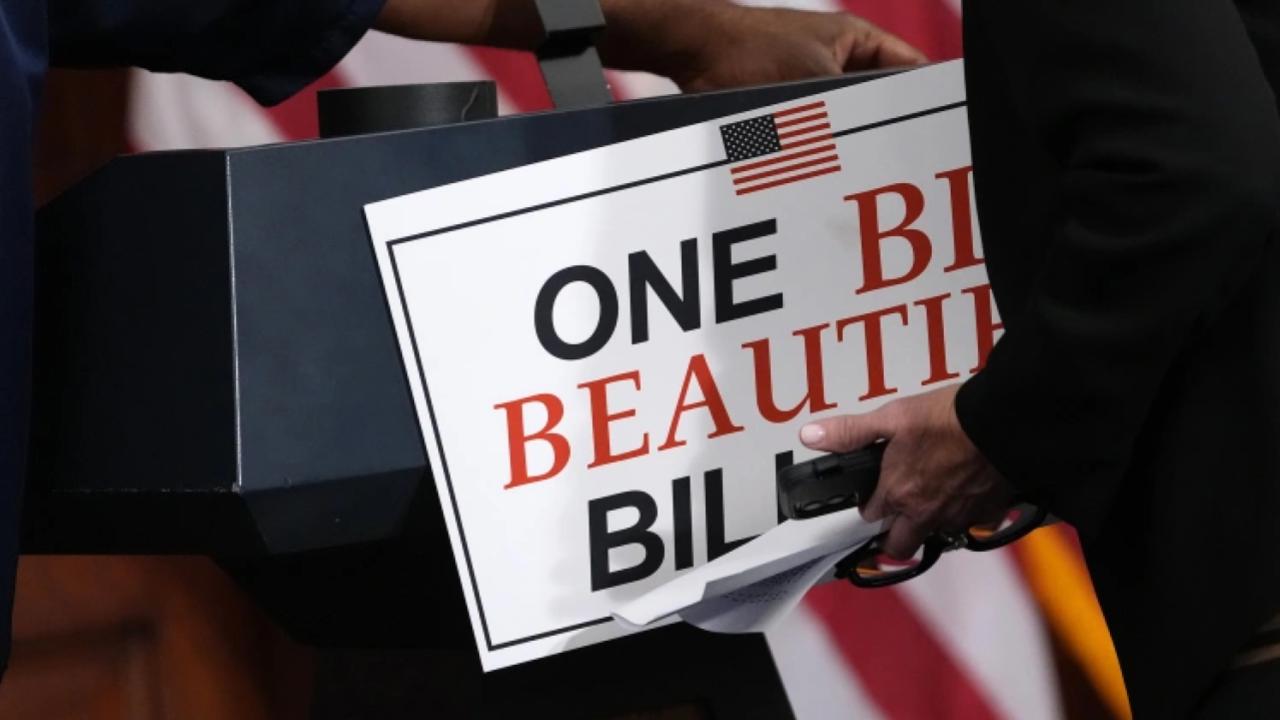In a twist that’s got all of Pittsburgh talking, Corey O’Connor has officially unseated Mayor Ed Gainey in the 2025 Democratic mayoral primary—an outcome that few political watchers saw coming. With the city’s deeply rooted Democratic history, this upset practically seals O’Connor’s ticket to City Hall come November.

With 91% of votes counted, O’Connor held a solid lead of 54% to 46%, clinching the win by around 4,300 votes, according to AP News. That margin might seem slim to outsiders, but in Pittsburgh’s local politics, it’s a thunderclap.
Corey O’Connor Shocks Pittsburgh by Defeating Mayor Ed Gainey
| Key Details | Information |
|---|---|
| Election | 2025 Democratic Primary – Pittsburgh Mayor |
| Winner | Corey O’Connor |
| Loser | Incumbent Mayor Ed Gainey |
| Vote Share | O’Connor: 54%, Gainey: 46% |
| Victory Margin | Approx. 4,300 votes |
| Position Held by O’Connor | Allegheny County Controller |
| Next Step | General election on November 4, 2025 |
| GOP Opponent | Tony Moreno |
Corey O’Connor’s victory over incumbent Mayor Ed Gainey wasn’t just a win—it was a wake-up call. Pittsburgh voters sent a loud message that they’re looking for real results, financial transparency, and bold leadership. With a powerful mix of name recognition, policy know-how, and voter trust, O’Connor is now poised to step into one of the city’s most powerful roles.
Who is Corey O’Connor? And Why Did He Win?
If you’ve lived in Pittsburgh for a hot minute, the name “O’Connor” probably rings a bell. Corey O’Connor is the son of the late Mayor Bob O’Connor, who served briefly in 2006 before his untimely passing. But this win isn’t just political legacy—it’s strategy, dissatisfaction, and timing all wrapped into one.
Currently the Allegheny County Controller, Corey O’Connor ran on a platform laser-focused on fiscal responsibility, public safety, and reviving downtown Pittsburgh. He hammered home issues like budget mismanagement, a shaky response to housing shortages, and growing concerns about urban decline.
Gainey’s Record: A Mixed Bag
Mayor Ed Gainey made history in 2021 as Pittsburgh’s first Black mayor, and his victory at the time was hailed as groundbreaking. His tenure saw some progress—especially on affordable housing, policing reform, and community investment.
But critics, including O’Connor, pointed to lagging downtown development, increasing crime fears, and underwhelming results in affordable housing expansion. Whether fair or not, voters responded loud and clear: they wanted change.
Breaking It Down: Why Pittsburgh Voted the Way It Did
Let’s walk through the major voter concerns that may have flipped the script.
1. Public Safety Anxiety
Post-COVID, many U.S. cities saw rising concerns over crime. In Pittsburgh, residents complained of a lack of police presence, slow 911 response times, and a sense of lawlessness downtown. O’Connor capitalized on this, promising increased patrols and smarter community policing.
2. Housing Woes
While Gainey touted new affordable housing units, waitlists remained long and rents continued to rise. O’Connor promised to streamline permitting and boost funding for low-income housing, which struck a chord with working-class voters and renters.
3. Downtown Decline
Let’s be honest—downtown Pittsburgh isn’t what it used to be. Post-pandemic, office vacancies soared, and storefronts sat empty. O’Connor’s plan to revitalize the Golden Triangle with tax incentives and small business aid gave him a crucial edge.
What Happens Next? November Is Just Around the Corner
Even though this was just a primary, the stakes are high. Pittsburgh hasn’t elected a Republican mayor in over 90 years, so unless something wild happens, Corey O’Connor is all but guaranteed to become the next mayor.
His opponent in the general election? Tony Moreno, a former police officer and staunch conservative who’s run before—but never cracked the Democratic machine.
But with Gainey out, could the race tighten? Probably not. Pittsburgh remains a deep blue city, and O’Connor’s crossover appeal makes him a safe bet.
The Big Picture: A Shift in Steel City Politics
This election isn’t just about two candidates—it’s a signal that voters are demanding more accountability, more results, and less politics-as-usual. Pittsburgh may love tradition, but it clearly doesn’t shy away from shaking things up when needed.
For younger voters and newcomers, O’Connor represents a younger, more pragmatic brand of Democrat. For older residents, the O’Connor name brings a nostalgic trust rooted in his father’s brief but beloved term.
Whether you’re a lifelong Yinzer or just following the headlines, one thing is certain: this election just flipped the playbook for 2025 city politics.
Frequently Asked Questions (FAQs)
Who is Corey O’Connor?
Corey O’Connor is the Allegheny County Controller and the son of former Pittsburgh Mayor Bob O’Connor. He’s known for his strong financial background and pragmatic policies.
Why did Ed Gainey lose the primary?
Voters cited dissatisfaction with public safety, housing progress, and the condition of downtown Pittsburgh. O’Connor offered clear policy solutions, winning over disillusioned voters.
Is Corey O’Connor likely to win in November?
Yes. Given Pittsburgh’s deep Democratic roots and the weak Republican opposition, O’Connor is considered the strong favorite.
What are O’Connor’s main priorities?
His top goals include improving public safety, revitalizing downtown, strengthening city finances, and fast-tracking affordable housing initiatives.
How significant is this election result?
It’s one of the biggest political upsets in recent Pittsburgh history and could influence similar local races across the country where incumbents are under fire for urban issues.






